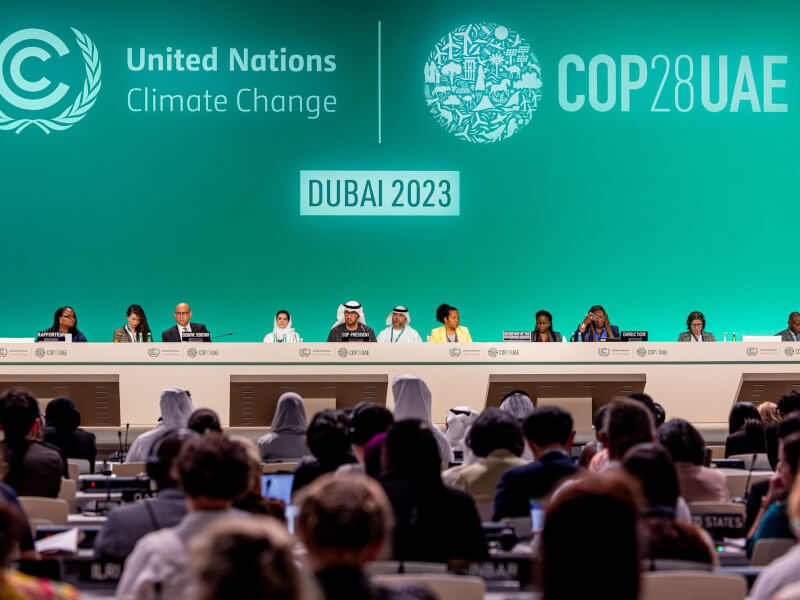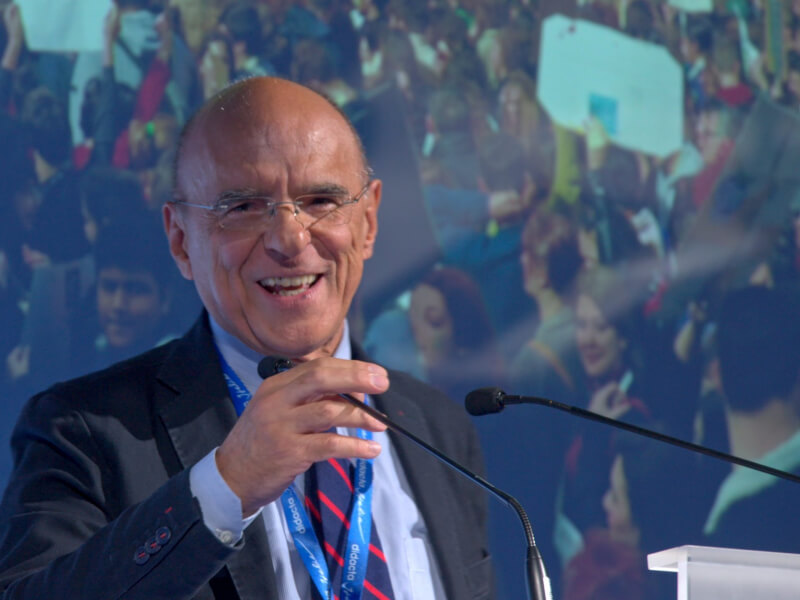15 December 2023 – COP28 has ended. The final consensus text includes language on a doubling of energy efficiency and a tripling of renewables and raises the spectre of “transitioning” away from fossil fuels. The vague acknowledgement that coal, oil and gas have had their day saves the conference from being a total failure, but the inability of countries to agree to phase out fossil fuels in the face of an ever worsening climate crisis is proof of a global leadership vacuum and our continued dependency on an extractive economic model.
While over 100 countries came to Dubai with a clear call to end the fossil fuel era, a handful of other rich, powerful nations and more than 2,500 lobbyists came to defend vested interests and the status quo. They fought tooth and nail at COP28, aided and abetted by fossil fuel lobbyists and big agricultural companies, to push back against science-based calls from the rest of the world, to act to try to stop global warming breaching the 1.5C limit agreed in the Paris Agreement. As former US Vice-President Al Gore said: “[The influence of the petrostates is clearly evident in the] half measures and loopholes in the final agreement”. And the fact next year’s climate summit will be held in Azerbaijan, another petrostate with huge vested interests to defend, only adds insult to injury.
The text is also weak on finance and how countries will pay for the move to a cleaner economy and adapt to the impacts of climate change. According to the International Energy Agency, achieving net-zero by 2050 will require annual global investment in the energy sector ranging from $5 trillion to over $7 trillion — a far cry from the $2 billion currently invested annually.
Answering the question of who should pay should not be difficult given the principle of “common but differentiated responsibilities” is a central tenet that requires governments to take on responsibilities in accordance with their historical contribution to the problem and the resources they command. In short, the lion’s share of climate finance will need to come from high-income countries.
And there is no shortage of capital. At a time when over two billion people live in energy poverty, oil and gas companies have been earning $2.8 billion every day for the last 50 years and benefitting from a whopping $16 billion a day in subsidies.
Further, as our report Earth for All: A Survival Guide for Humanity shows, worsening inequality will condemn communities to poverty, drive up social tensions and drive down wellbeing. Inequality is already destabilising societies and impacting democracies and the rule of law.
As reported by Reuters last year, climate change could see 4% of global annual economic output lost by 2050, hitting many poorer parts of the world disproportionately hard. Yet the Giant Leap scenario in Earth for All, where action is taken to stabilise the temperature below a 2C rise and dramatically increase equity, would only require 2-4 per cent of GDP. This scenario would also move the world closer to ending extreme poverty by 2050 and reducing rising social tensions.
So what does this mean for the future of COPs?
The enormous gap between what science and justice require and what powerful petro actors are willing to accept highlights the fundamental inability of COPs to deliver climate action at speed and scale.
The lack of leadership and the inability of our leaders and institutions to deal with the world’s most pressing issues is not limited to climate change. While the COP28 text was being negotiated, the US blocked the UN resolution calling for a ceasefire in Gaza.
Our international institutions are caught in a time warp, incapable of managing today’s challenges. They perpetuate deep inequality between nations, enabling the strongest countries to crush weaker ones. This situation was especially evident at COP28 where in the face of cries by small island states for the world to act to protect their very existence, certain countries chose instead to argue over semantics and to insist on an agreement that leaves them in limbo.
It is time for a reset.
To be effective in 2024 and beyond, we must create alternative governance forums to manage the phase out of fossil fuels, free from the undue influence of petro-actors. We need institutions rooted in equality and solidarity and hard-wired to build bridges and find shared science-based solutions to global challenges. A recent survey concluded that 74 per cent of G20 citizens support a wellbeing economy where health, happiness and greater equality are prioritised over wealth creation for the few.
We are living in a planetary emergency. Our international institutions must wake up to the imperative of reform. To meet our 1.5°C goal, we need a COP equipped and empowered with the authority to close the gap between science and action, prevent backtracking and ensure the safe landing of global climate commitments. Reformed financial and economic systems and brave leadership will also be needed to make this safe landing a reality.
First published in Reuters






